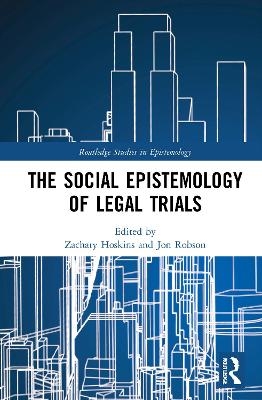
The Social Epistemology of Legal Trials
Routledge (Verlag)
978-0-367-24553-5 (ISBN)
This collection is the first book-length examination of the various epistemological issues underlying legal trials. Trials are centrally concerned with determining truth: whether a criminal defendant has in fact culpably committed the act of which they are accused, or whether a civil defendant is in fact responsible for the damages alleged by the plaintiff.
Truth is not, however, the only epistemic value which seems relevant to how trials proceed. We may think that a jury shouldn’t convict a defendant, even one who is as a matter of fact guilty, unless its members know or at least are justified in believing that the defendant committed the crime in question. Similarly, we might reasonably assume that the trier of fact must have some level of understanding to reach an adequate verdict in any case, but legitimate questions arise as to what level of understanding should be required.
The essays collected in this volume consider a range of epistemological issues raised by trials, such as how much credence jurors should give to eyewitness testimony, the admissibility and role of statistical evidence, and the appropriate standards of proof in different contexts.
The Social Epistemology of Legal Trials will be of interest to scholars and upper-level students working on issues at the intersection of epistemology and philosophy of law.
Zachary Hoskins is an associate professor of philosophy at the University of Nottingham. He is author of Beyond Punishment? A Normative Account of the Collateral Legal Consequences of Conviction (2019) and is co-editor of The New Philosophy of Criminal Law (2016) and International Criminal Law and Philosophy (2010). Jon Robson is an assistant professor of philosophy at the University of Nottingham. He is co-editor of Aesthetics and the Sciences of Mind (2014) and The Aesthetics of Videogames (Routledge, 2018) as well as co-author of A Critical Introduction to the Metaphysics of Time (2016).
Introduction
Zachary Hoskins and Jon Robson
1. Credibility Deficits, Memory Errors, and the Criminal Trial
Kathy Puddifoot
2. Eyewitness Testimony, the Misinformation Effect, and Reasonable Doubt
Christopher Bennett
3. On Testifying and Giving Evidence
Stephen Wright
4. Explaining the Justificatory Asymmetry Between Statistical and Individualized Evidence
Renèe Jorgensen Bolinger
5. Character, "Propensities", and the (Mis)use of Statistics in Criminal Trials
R.A. Duff and S.E. Marshall
6. Against Legal Probabilism
Martin Smith
7. Justified Belief and Just Conviction
Clayton Littlejohn
8. The "She Said, He Said" Paradox and the Proof Paradox
Georgi Gardiner
9. Against the Odds: The Case for a Modal Understanding of Due Care
Jeffrey Helmreich and Duncan Pritchard
10. Criminal Trials for Preventive Deprivations of Liberty
Hadassa Noorda
| Erscheinungsdatum | 24.02.2021 |
|---|---|
| Reihe/Serie | Routledge Studies in Epistemology |
| Zusatzinfo | 3 Tables, black and white |
| Verlagsort | London |
| Sprache | englisch |
| Maße | 152 x 229 mm |
| Gewicht | 376 g |
| Themenwelt | Geisteswissenschaften ► Philosophie ► Erkenntnistheorie / Wissenschaftstheorie |
| Geisteswissenschaften ► Philosophie ► Ethik | |
| Recht / Steuern ► Allgemeines / Lexika | |
| Recht / Steuern ► EU / Internationales Recht | |
| ISBN-10 | 0-367-24553-1 / 0367245531 |
| ISBN-13 | 978-0-367-24553-5 / 9780367245535 |
| Zustand | Neuware |
| Haben Sie eine Frage zum Produkt? |
aus dem Bereich


![Was heißt Denken?. Vorlesung Wintersemester 1951/52. [Was bedeutet das alles?] - Martin Heidegger](/media/113619842)